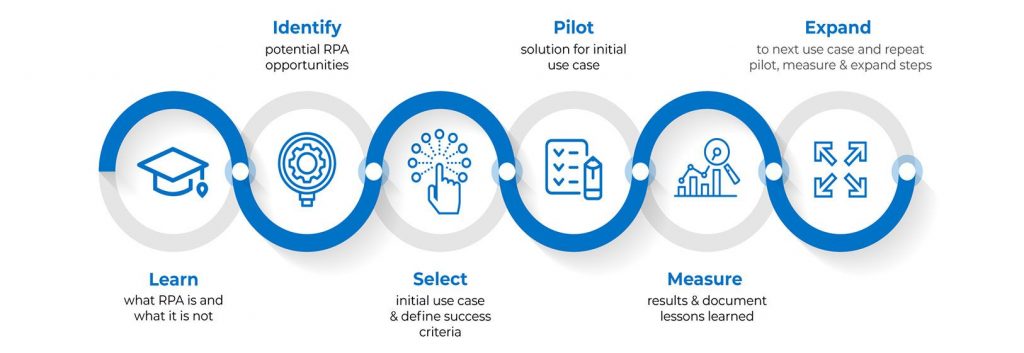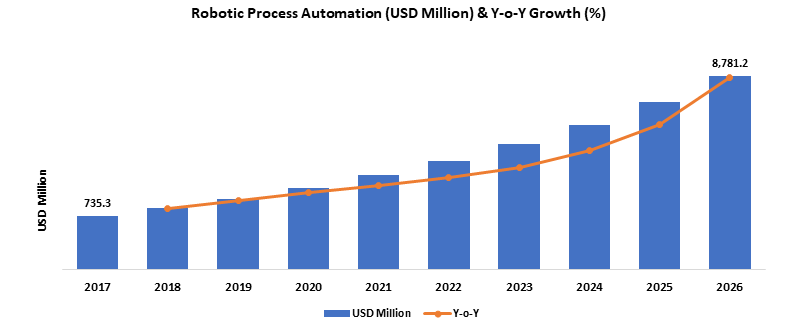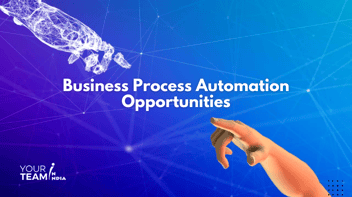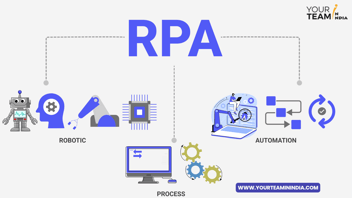The future is all about automation, and this RPA guide for businesses is precisely about why you should use RPA in your business processes to experience success in this digitally transforming world.
The global robotic process automation market size is already valued at $1.40 billion in 2019 and is expected to reach $11 billion by 2027, expanding at a CAGR of 34% from 2020 to 2027.
Let’s jump straight into this informative RPA guide for businesses to understand what is it, how it works, and how you can take advantage of this technology. And, how can RPA help every business grow and glow like never before.
Let’s start!
What is Robotic Process Automation (RPA)?
Robotic Process Automation (RPA) needs minimal code, allowing you to enjoy an interactive interface, easy to set up, and usually offers a significant return on investment to businesses. That, indeed, is good news for the RPA developers and the business owners as well.
Wikipedia says RPA is:
“Robotic process automation (or RPA) is a form of business process automation technology based on metaphorical software robots (bots) or on artificial intelligence (AI)/digital workers. It is sometimes referred to as software robotics (not to be confused with robot software).”
Gartner says RPA is:
“Robotic process automation (RPA) is a productivity tool that allows a user to configure one or more scripts (which some vendors refer to as “bots”) to activate specific keystrokes in an automated fashion.”
Being a business owner, what would you really prefer? Would you rather prioritize spending time doing humdrum routine work or invest time in activities that yield a higher ROI? Obviously, everyone will go for the latter!
How Does Robotic Process Automation (RPA) Work?
Robotic Process Automation software bots imitate and fuse human interactions with digital systems to completely automate business operations. Now, that is done by training the RPA bots by giving them a series of specific steps, including feeding data, allowing user permissions, preparing and sending the invoice, and other such tasks.
RPA relies on software robots, which we even know as bots, to automate different tasks of the business. The bots utilize different RPA software and tools to do so. To access RPA tools, you will need to connect with RPA consultants, whom you can really count on. Some of the most prominent who are dominating the RPA market are Blue Prism and UiPath.
What are Different Types of Robotic Process Automation?
There are three ways you can use RPA tools, which are primarily listed below:
- Attended RPA, where bots are invoked by the user and used for customer services.
- Unattended RPA bots perform tasks in batches based on automatic triggers.
- Hybrid RPA, is a combination of both the types stated above.
Benefits of RPA for Businesses?
RPA introduces businesses to several benefits, which clearly they lacked earlier (and a crucial part of the growth). Those who have already experienced the benefits of Robotic Process Automation would say something like this:
“RPA is a promising new development in business automation that offers a potential ROI of 30–200 percent — in the first year” - McKinsey
Or, this:
“In our bank, we have people doing work like robots. Tomorrow we will have robots behaving like people. It doesn’t matter if we as a bank will participate in these changes or not, it is going to happen.” - John Cryan, CEO of Deutsche Bank
So, what are these market dominators enjoying that your business isn’t?
Advantages of RPA for your Business
Let’s figure that out quickly as we proceed with this RPA guide!!
1. Enhanced Productivity
RPA bots function on a set of pre-established rules and constantly run checks for numbers and process times naturally becomes much more efficient than ever before. So, when you implement RPA into your business processes, the employees can actually work on more productive business processes while allowing bots to function automatically as per the pre-set rules.
2. No Technical Hindrances
Since it is not essential to be a super techie to deal with RPA, almost anyone can work seamlessly with the RPA. Simply put, you don’t need to essentially have programming skills to configure the automation software robot of Robotic Process. However, if you already have a knowledge of programming, it could be seen as an added benefit for the functioning of RPA. Robotic Process Automation is code-free technology, that helps almost anyone automate the business processes without any hindrances.
3. Improved Employee Satisfaction
The best part of RPA is its ability to eliminate the boring, mind-numbing, and tedious business chores, which helps employees focus on better productive activities of the organization. As a result, they have a higher chance of improving the cognitive skills that allow them to focus efficiently on high-value tasks. Overall, when you start using RPA in your business processes, employees’ satisfaction rate accelerates, making them more productive and contented with what they do. Overall, they enjoy their jobs, stay happy, found their work more meaningful.
4. Reliable Compatibility
Some of you might still be using the traditional automation systems, which compels you to invest resources in new infrastructure to integrate processes across different apps. However, with RPA, there is no such compelling to invest resources, as RPA doesn’t really disrupt the underlying systems. Hence, you don’t need to invest in additional resources if you use RPA to automate your business processes.
5. Outstanding Digital Transformation
Digital transformation primarily relies on technology and how your business adopts and implements it. RPA helps you utilize the fundamental framework that allows your business to automate business operations independently. Hence, when your employees are focusing on more productive processes of the organization, while RPA is doing its job of making mundane and repetitive tasks simple is when you truly experience the digital transformation.
Businesses or entrepreneurs who still are not introduced to RPA understand how much time and effort goes into handling those mundane organizational tasks. Integrating RPA into their business processes can evidently increase productivity, keep employees contented, and accelerate profitability exponentially.
How Can RPA Help your Businesses?
Now, let’s see how RPA can specifically help small businesses in this modern business world. First, since the cost can be the most prominent factor that most SMBs worry about, having RPA to support your growth initially (even once you are properly established) can do wonders for your business.
So, here’s how RPA is going to help your business:
1. Invoice Processing
Financial processes in any business are essential; however, it could be tiring to handle the invoices. Moreover, when dealing with it manually, it can consume a lot of time and effort of your employees.
Automated RPA can easily recognize the files and dissect data from them without needing any human input. Moreover, since invoicing is a rules-based process, it makes it a perfect job for the unattended RPA bot.
2. Payroll Tasks
The human resource department is well acquainted with how tedious the payroll-related tasks can be. For them, RPA is a savior! This technology, including tools like Otto AI, can be efficiently used for attendance management to help track employee hours and manage earnings accordingly, without needing any input from human resources.
Many of such tasks as payroll and invoicing are considered low-hanging fruit, which need to be automated in every business - be it small or large.
3. Storing and Managing Information
Big data is common with businesses and SMBs store more data than ever before. Hence, smooth management of mountains of information is essential. RPA seamlessly sift through vast amounts of data without any error and interruption.
It can streamline the processes that can take hours and hours for employees to sort and manage. Hence, RPA can help small businesses store, manage, and constantly monitor the bulk of data quickly and with minimum chances of errors and interruption.
4. Customer Service
Small businesses can receive a stream of complaints, which they might be dealing with themselves manually. However, with RPA, which is programmed to manage the business processes and complaints already, you can manage multiple complaint requests immediately and without needing to have human interaction anyway.
That allows for a much quicker response and helps to settle those requests more efficiently. RPA automation completely transforms how small businesses can deal with their customers by allowing more efficient ticket resolution.
5. Employee Onboarding
When you are running a small business, it is evident that onboarding will litter with admin tasks, which are not just repetitive but super dull as well. RPA automation can simply automate such tasks, generate, send offers, and automate the entire workflow involved during the onboarding process.
We all understand how expensive and wasteful paper is, which can significantly be reduced with the usage of RPA. In addition, having an electronic capture system will eliminate the need to create copies of documents, as everything functions digitally.
RPA is Boon for your Business
RPA inevitably is becoming a part of businesses nowadays. The core need is to reduce the redundant tasks of the organization, indulge employees in more productive chores, and save time, cost, and effort significantly.
Moreover, technologies like RPA are much-needed to stay ahead of your competitors, minimize the tasks of your RPA developers, and keep your business running in the right direction with automation.
Hence, RPA, in every sense, is essential for your business. It automates those mind-numbing tasks and also keeps employees happy, which is one of the most critical factors involved in keeping a business running and growing for years. So RPA, indeed, is essential for your business.
At Your Team In India, we have a pool of certified RPA engineers. Need help setting up a dedicated team of developers in India? Connect with us our business head now and get a free consultation.









